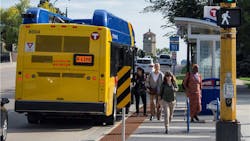METRO Purple Line BRT approved to enter New Starts project development
The Federal Transit Administration (FTA) has approved the METRO Purple Line to enter the Project Development phase of the Capital Investment Grants (CIG) Program under New Starts. Approval to enter the project development phase means leadership of the project now transitions to the Metropolitan Council from Ramsey County, Minn.
The project cleared environmental assessments this fall with the FTA issuing a Finding of No Significant Impact and Ramsey County issuing a Findings of Fact and Conclusions document to comply with the Minnesota Environmental Policy Act.
The 15-mile bus rapid transit line will serve St. Paul, Maplewood, Vadnais Heights, Gem Lake, White Bear Township and White Bear Lake. It will feature electric buses operating primarily in dedicated transit lanes. The line will serve 21 stations and is anticipated to open in 2026. By 2040, the average weekday ridership is expected to reach 7,000.
“The Metropolitan Council is proud to prioritize this East Metro investment,” said Metropolitan Council Chair Charlie Zelle. "With our local government partners, including Ramsey County, we look forward to seeing the significant economic, social and environmental benefit the Purple Line will bring to our region."
Major employers along the Purple Line include Regions and Gillette Children’s Specialty Healthcare hospitals in St. Paul, M Health Fairview St. John’s Hospital in Maplewood and the Maplewood Mall. Other destinations include Lowertown, the St. Paul central business district, Payne-Phalen, Hmong Village, Phalen Regional Park and downtown White Bear Lake.
Ramsey County Commissioner Victoria Reinhardt called the Purple Line BRT a “key transportation solution” needed for the East Metro area to stay competitive and connected.
“A lot of jobs cannot be performed at home in this corridor, which has three hospitals and a shopping mall," said Shannon Watson, vice president of public affairs for the St. Paul Area Chamber. "That is not likely to change, making the Purple Line a lifeline for people going to work, outpatient visits and running errands."
The Metropolitan Council anticipates seeking federal approval for the project to move to the engineering phase in 2023, where the FTA will review the project’s scope, schedule and budget. The current project cost is approximately $475 million with Ramsey County covering the local share and FTA providing a grant through the CIG program. The line’s operating costs will be shared by the Metropolitan Council and Ramsey County.
About the Author

Mischa Wanek-Libman
Group Editorial Director
Mischa Wanek-Libman is director of communications with Transdev North America. She has more than 20 years of experience working in the transportation industry covering construction projects, engineering challenges, transit and rail operations and best practices.
Wanek-Libman has held top editorial positions at freight rail and public transportation business-to-business publications including as editor-in-chief and editorial director of Mass Transit from 2018-2024. She has been recognized for editorial excellence through her individual work, as well as for collaborative content.
She is an active member of the American Public Transportation Association's Marketing and Communications Committee and served 14 years as a Board Observer on the National Railroad Construction and Maintenance Association (NRC) Board of Directors.
She is a graduate of Drake University in Des Moines, Iowa, where she earned a Bachelor of Arts degree in Journalism and Mass Communication.
